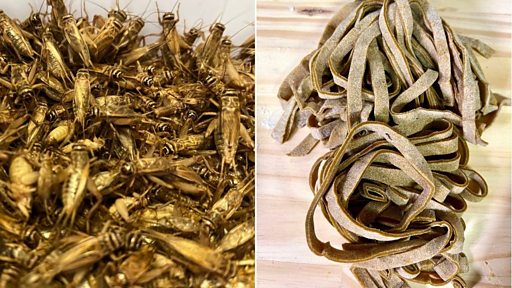Overcoming Resistance: Insects Appear on Italian Plates Against All Odds

In a small room near the Alps in northern Italy, millions of crickets are being processed to become food despite initial resistance. The crickets are frozen, boiled, dried, and pulverized to create a light brown flour used in various food products such as pasta, bread, energy bars, and even sports drinks. Italy, known for its culinary traditions, has traditionally resisted the idea of eating insects, with the government even taking steps to ban their use in pizza and pasta production. However, several Italian producers have been experimenting with cricket-based pasta, pizza, and snacks.
The shift towards insect consumption in Italy is driven by sustainability concerns. Insect farming requires significantly less water and land compared to traditional livestock farming, making it a more environmentally friendly option. Insects are also rich in vitamins, fiber, minerals, and amino acids, making them a nutritious superfood. However, the main challenge to widespread adoption of insect-based food is the price, as it remains more expensive than traditional alternatives.
In addition to cost, social acceptance plays a role in the resistance to insect food in Italy. The country prides itself on its Mediterranean diet, and some view insect products as a threat to Italian culinary traditions. Concerns about the potential health effects of consuming insects and the fear of deviating from established eating habits contribute to the opposition.
Italy is not the only country divided on the issue of insect food. Poland and other European countries have seen debates and political disputes surrounding the topic. However, countries like Austria, Belgium, and the Netherlands have shown more openness to insect consumption.
As the global population continues to grow, finding sustainable food sources becomes crucial. Insect consumption is seen as a potential solution to meet the rising demand while minimizing the environmental impact. With the recent approval of insect consumption by the EU, the insect food sector is expected to grow, leading to potential price reductions and increased availability.
Producers like Ivan Albano, who runs the Italian Cricket Farm, see insect farming as an environmentally friendly and sustainable practice that could play a role in addressing global food challenges. Despite initial resistance, more people are showing curiosity and ordering cricket-based products, indicating a shifting mindset towards insect consumption. The hope is that as awareness and acceptance increase, insect food will become a viable option to feed the growing population while minimizing ecological impact.
Picture Courtesy: Google/images are subject to copyright
